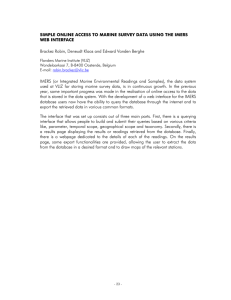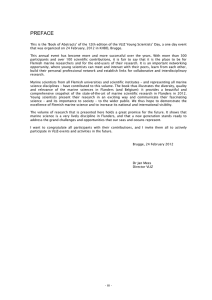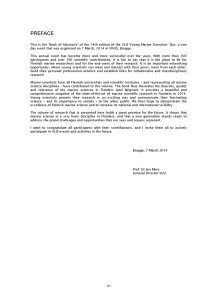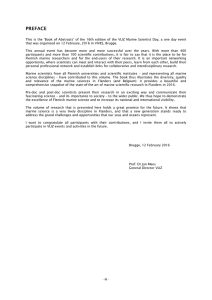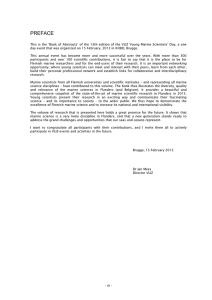Document 11117667
advertisement
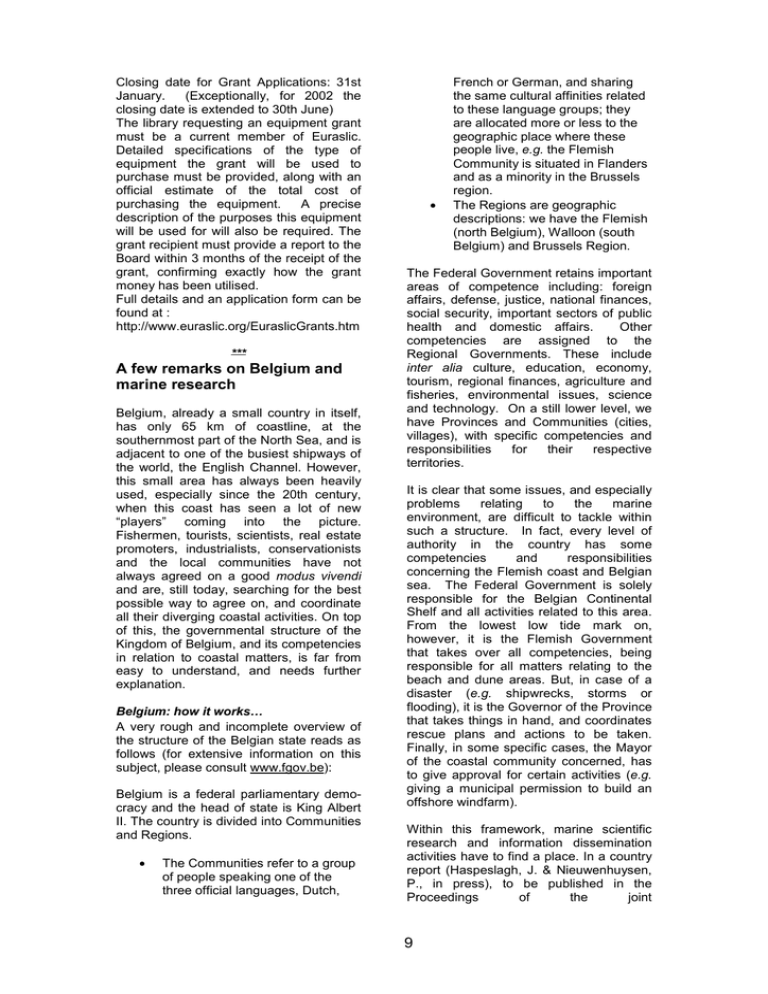
Closing date for Grant Applications: 31st January. (Exceptionally, for 2002 the closing date is extended to 30th June) The library requesting an equipment grant must be a current member of Euraslic. Detailed specifications of the type of equipment the grant will be used to purchase must be provided, along with an official estimate of the total cost of purchasing the equipment. A precise description of the purposes this equipment will be used for will also be required. The grant recipient must provide a report to the Board within 3 months of the receipt of the grant, confirming exactly how the grant money has been utilised. Full details and an application form can be found at : http://www.euraslic.org/EuraslicGrants.htm *** A few remarks on Belgium and marine research Belgium, already a small country in itself, has only 65 km of coastline, at the southernmost part of the North Sea, and is adjacent to one of the busiest shipways of the world, the English Channel. However, this small area has always been heavily used, especially since the 20th century, when this coast has seen a lot of new “players” coming into the picture. Fishermen, tourists, scientists, real estate promoters, industrialists, conservationists and the local communities have not always agreed on a good modus vivendi and are, still today, searching for the best possible way to agree on, and coordinate all their diverging coastal activities. On top of this, the governmental structure of the Kingdom of Belgium, and its competencies in relation to coastal matters, is far from easy to understand, and needs further explanation. Belgium: how it works… A very rough and incomplete overview of the structure of the Belgian state reads as follows (for extensive information on this subject, please consult www.fgov.be): Belgium is a federal parliamentary democracy and the head of state is King Albert II. The country is divided into Communities and Regions. • The Communities refer to a group of people speaking one of the three official languages, Dutch, • French or German, and sharing the same cultural affinities related to these language groups; they are allocated more or less to the geographic place where these people live, e.g. the Flemish Community is situated in Flanders and as a minority in the Brussels region. The Regions are geographic descriptions: we have the Flemish (north Belgium), Walloon (south Belgium) and Brussels Region. The Federal Government retains important areas of competence including: foreign affairs, defense, justice, national finances, social security, important sectors of public health and domestic affairs. Other competencies are assigned to the Regional Governments. These include inter alia culture, education, economy, tourism, regional finances, agriculture and fisheries, environmental issues, science and technology. On a still lower level, we have Provinces and Communities (cities, villages), with specific competencies and responsibilities for their respective territories. It is clear that some issues, and especially problems relating to the marine environment, are difficult to tackle within such a structure. In fact, every level of authority in the country has some competencies and responsibilities concerning the Flemish coast and Belgian sea. The Federal Government is solely responsible for the Belgian Continental Shelf and all activities related to this area. From the lowest low tide mark on, however, it is the Flemish Government that takes over all competencies, being responsible for all matters relating to the beach and dune areas. But, in case of a disaster (e.g. shipwrecks, storms or flooding), it is the Governor of the Province that takes things in hand, and coordinates rescue plans and actions to be taken. Finally, in some specific cases, the Mayor of the coastal community concerned, has to give approval for certain activities (e.g. giving a municipal permission to build an offshore windfarm). Within this framework, marine scientific research and information dissemination activities have to find a place. In a country report (Haspeslagh, J. & Nieuwenhuysen, P., in press), to be published in the Proceedings of the joint 9 IAMSLIC/EURASLIC meeting, Brest, France, 14-18 Oct 2001, the evolution of these activities is explained. In the following paragraphs two of the main organisations and institutes, dealing with marine research on one hand, and dealing with coordination, support and information on the other hand, will be highlighted. Of course, many other organisations in the country are working very hard in the marine field, but they cannot all be mentioned in this brief article. For extensive information on marine related institutions in Belgium, please consult http://www.vliz.be/vmdcdata/Imis/instsrch. htm, where you will find a directory of all Belgian marine organisations. Nationally organized marine research On the federal level, the Belgian Institute of Natural Sciences has a well established marine division, The Management Unit of the North Sea Mathematical Models and the Scheldt estuary, abbreviated to MUMM (www.mumm.ac.be/en/index.php). As MUMM is a federal organisation, their main working area is the Belgian Continental Shelf. The research strategy focuses on three topics: modelling, monitoring and management of the research area. • • • Modelling involves studying the ecosystems of the North Sea using mathematical modelling techniques, with a view to understanding how they function and to providing certain forecasting capabilities. Monitoring relates to collecting marine information required to validate the models and make them operational, along with the various techniques used to assess the condition of the marine environment. Management means representing Belgium in a number of intergovernmental conventions dealing with the protection of the marine environment, including the preparation of Belgian positions to be upheld and the implementation of decisions taken, under the authority of the Minister responsible for marine environmental policy. institutes (e.g. universities) for marine research projects and monitoring. Thus, MUMM gives logistic support to marine research activities that it cannot organise itself. As MUMM is a division of the Belgian Institute of Natural Sciences, bibliographies of the literature related to these federal marine activities can be accessed via the central library of the Belgian Institute of Natural Sciences. This old, respected and very large scientific library is undergoing major changes which will soon result in enhanced access to the catalogues and collections through the www, and more streamlined ILL-facilities. In the intermediate stages, parts of the catalogues can already be consulted here: www.naturalsciences.be/science/library. Regional level: a integrated project for the marine community On a lower governmental level, namely that of the Flemish region, the recently (1999) established Flanders Marine Institute (VLIZ) has very quickly filled in long-neglected needs for the marine community as a whole. Studies commissioned by the Federal Office for Scientific, Technical and Cultural Affairs (OSTC) in the late 1990s clearly showed that there was a substantial lack of coordination in marine research activities, that communication between research groups, and communication towards the general public could be better organised, and that the need for additional logistic support and oceanographic platforms was urgent. In this respect, the Flemish Government, together with the Province of West-Flanders, and the Belgian National Science Foundation (the three founding instances of the institute), stimulated VLIZ to formulate and execute a set of priorities, namely: • • MUMM also deploys a research vessel, the Belgica. It is important to note here that this vessel can also be used by other 10 building an information and coordination centre for marine research in Flanders. VLIZ functions in this respect as a coordination platform for policy, for federal and institutional collaboration and for logistic support of the scientific research creating an oceanographic platform. VLIZ deploys the vessel Zeeleeuw, and is responsible for management, maintenance and utilisation of the shared research equipment and infrastructure • • • • building the Flanders Marine Data and Information Centre. The Centre assembles different types of data and information, implements international standards, (re)distributes data nationally and internationally, and manages a specialised marinescientific library increase the visibility of Flanders concerning marine research. VLIZ provides information from and to the international community and functions as an international contact point for the Flemish marine researchers VLIZ carries out other activities in support of marine sciences, e.g. public awareness campaigns, and management of a marine literature-collection aimed at general readers. VLIZ will advise, and make proposals upon request from the Flemish Government or on its own initiative, and functions as a point of contact for several ad hoc assignments of the Flemish Government. The Institute has been able to meet these demands, and is widely accepted in the country as the main partner for coordinating, organising and supporting activities in relation to the marine environment. The RV Zeeleeuw is complementary to the activities of RV Belgica, and both ships enjoy a year-round filled cruise-schedule. Both vessels are deployed according to their specific characteristics and operational area to best accommodate the scientific community’s requests for shipboard time. It is important to emphasize that neither MUMM nor VLIZ will make claims to specific operational areas, activities, research domains or any other delineation in the deployment of both vessels. Information management: integration of all partners and knowledge items In the field of marine information management, the VLIZ Marine Data and Information Centre also has specific objectives: • to provide researchers, the government and those interested with data and information, in a suitable and prompt way • • • • to stimulate networking by means of maximum centralisation of the available data of research groups and governmental authorities, also on an international scale to detect needs; create series of data for interdisciplinary research, taking into account the accepted international standards integration of different types of data, including control on consistency and quality building and managing a multimedia marine literature collection, in an open networked library environment To meet its objectives, the VMDC makes data-exchange agreements with relevant partners, firstly with research teams from Flemish universities, research institutes, and government departments with similar objectives. International activities are undertaken through close collaboration with the Intergovernmental Oceanographic Commission (IOC) of UNESCO. The Data Centre is the National Oceanographic Data Centre (NODC) for Flanders, and it is actively involved in several initiatives of the IOC Committee on International Oceanographic Data and Information Exchange (IODE). The library is part of national library networks (such as Antilope, CCB, Felnet, VOWB, VVBAD: see the above mentioned country report for more information), and international marine library associations (EURASLIC, IAMSLIC). It also functions as the National ASFA-partner for Belgium. One of its core projects (in cooperation with the Data Center) is the management of the IMIS-database (Integrated Marine Information System). A paper on this specific marine information tool will be published in the forthcoming Proceedings of the joint IAMSLIC/EURASLIC meeting, Brest, France, 14-18 Oct 2001 (Haspeslagh, J.P. & Vanden Berghe, E., in press). It is to be noted that, although it has only been operational since the beginning of 2001, the IMIS-database serves more and more as the main information gateway for the whole of the Flemish (and Belgian) marine community. All relevant information pertaining to Flemish marine sciences and research (e.g. expertise, institute and organisation directories, literature, symposia, projects, and datasets) are accessible and 11 searchable through one access-point (www.vliz.be/vmdcdata/Imis/index.htm). Conclusion Of course, many other very relevant activities take place in MUMM and VLIZ. For a complete overview, please consult www.mumm.ac.be/en/index.php for information on MUMM, and for information on VLIZ www.vliz.be/en/intro.htm. Even though the two cited institutes play an important role in the Belgian marine field, there are, as already mentioned, many other important players in the field. The interested reader will find a complete overview of the Belgian marine scientific world, and of organisations dealing with marine information through a simple search in the IMIS-database (see: www.vliz.be/vmdcdata/Imis/index.htm). A lot of work has been done in Belgium in recent years to enhance the visibility and efficiency of the marine scientific community, and in the field of marine information dissemination, and much progress has been made. We feel that the Belgian marine community has very strong assets and qualities, and that this group of people, institutes and organisations will continue its positive work to improve the knowledge of the marine environment. Nationally and internationally, this community will strive to further cooperate with all interested partners in the marine area. Networks like EURASLIC play an important role as information channels to carry out the message of continued interest in, and concern for the seas around us. We hope that Belgium can continue to add its efforts to this huge task, together with as many other sea states as possible. Jan Haspeslagh *** Announcement EurOcean, a new European centre for information on marine science and technology, was opened by Portuguese and French officials in Lisbon on 28 February. The new centre aims to provide an impetus to creating a European marine policy and also to contribute to the development of a marine European research area. The centre will be using the conclusions of the report 'Towards a new marine dimension for Europe through research and technological development', which was presented to the Research Council in June 2000, as some of its goals. The Council took place during the Portuguese Presidency of the EU, and the Portuguese Research Minister, Jose Mariano Gago, was present at the opening of EurOcean. The initiative to establish the centre came from the Portuguese government, supported by France, during the year of the ocean in 1998. Specifically, EurOcean plans to facilitate cooperation between European organisations involved in marine science and technology, to compile information on new trends in marine research and technology and to implement an operational online system to identify sources of information. The first project EurOcean has taken on is to establish an Internet portal for marine science and technology, which will provide information on areas related to marine research. In addition, an agreement has been reached whereby EurOcean will maintain the Intergovernmental oceanographic commission's regional portal for Europe. E-mail: eurocean@fct.mct.pt For further information: http://www.eurocean.org *** Publications PUSHING FORWARD THE LIBRARY OF THE MARINE SCIENCES INSTITUTE OF ANDALUSIA. Enrique Wulff Barreiro. Managing Information March 2002. p.32. Promoting the library of the Marine Sciences Institute of Andalusia, Spanish Council for Scientific Research. This article displays the very essence of what e-content is about. A complete, varied and very important collection in its field, held in a variety of formats and media, and the need to make it all available electronically. International forums where the library has been welcome, like the International Council for Scientific Unions (CODATA), and IAMSLIC/EURASLIC, are listed. MANAGING RESOURCES IN A SEA OF CHANGE: Proceedings of the 27th Annual Conference of the International 12
